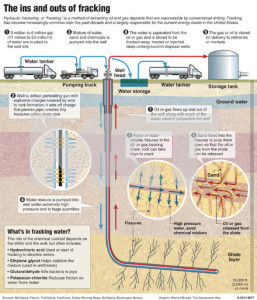The debate over fracking
 Since 1949, the idea of hydraulic fracturing, or fracking for short, has been a controversial technology debated over the decades. Being in the midst of an oil rush, many countries including the United States have enacted the technology of fracking in order to release new sources of energy and expand the fuel economy. Although this technological system of extracting energy that was once unreachable has been successful, many environmentalists and other activists have stated many harms that outweigh the benefits. According to Dangersoffracking.com, it takes 72 trillion gallons of water and 360 billion gallons of harmful chemicals to run the U.S fracking wells. Dangersoffracking.com also adds that methane and other toxic chemicals from fracking are released into the drinking wells and air of many regions in the United States, with there being over 1,000 documented cases of sensory, neurological and respiratory damage due to contaminated water from fracking. Advocates of fracking would like to argue that fracking creates many jobs and boosts local economies. According to Energyfromshale.org, fracking one single well only takes two to five days but generates enough energy to power a local town for decades. Energyfromshale.org also adds that the use of natural gas from fracking reduces CO2 emissions, and 81% of the U.S’s fuel use is from natural gas. Although there are both benefits and negatives to fracking, it is evident that this technological advancement will be debated for many years to come.
Since 1949, the idea of hydraulic fracturing, or fracking for short, has been a controversial technology debated over the decades. Being in the midst of an oil rush, many countries including the United States have enacted the technology of fracking in order to release new sources of energy and expand the fuel economy. Although this technological system of extracting energy that was once unreachable has been successful, many environmentalists and other activists have stated many harms that outweigh the benefits. According to Dangersoffracking.com, it takes 72 trillion gallons of water and 360 billion gallons of harmful chemicals to run the U.S fracking wells. Dangersoffracking.com also adds that methane and other toxic chemicals from fracking are released into the drinking wells and air of many regions in the United States, with there being over 1,000 documented cases of sensory, neurological and respiratory damage due to contaminated water from fracking. Advocates of fracking would like to argue that fracking creates many jobs and boosts local economies. According to Energyfromshale.org, fracking one single well only takes two to five days but generates enough energy to power a local town for decades. Energyfromshale.org also adds that the use of natural gas from fracking reduces CO2 emissions, and 81% of the U.S’s fuel use is from natural gas. Although there are both benefits and negatives to fracking, it is evident that this technological advancement will be debated for many years to come.
Your donation supports the student journalists of McIntosh High School. Your contribution allows us to cover our annual website hosting costs, to have access to Reuters images for international and national news and feature stories, to purchase more and updated equipment such as cameras, lenses, and digital voice recorders, and continuing education for staff, such as SNO training and MediaNow! editorial leadership training.

